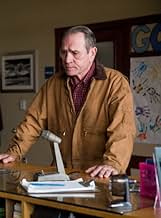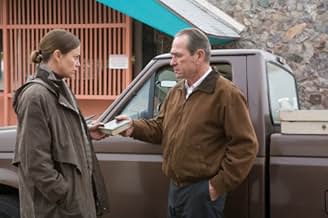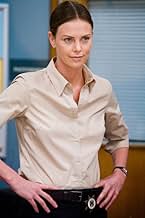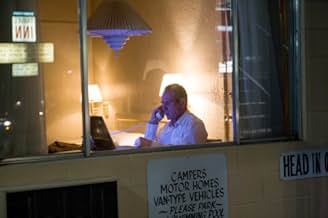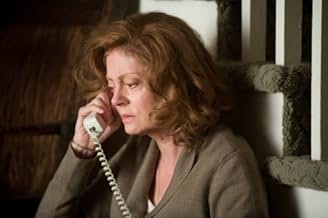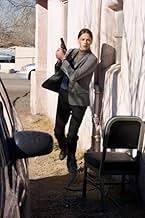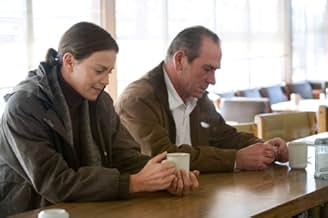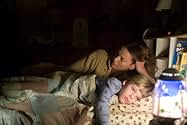IMDb-BEWERTUNG
7,1/10
76.621
IHRE BEWERTUNG
Ein pensionierter Militärermittler arbeitet mit einem Polizeibeamten zusammen, um die Wahrheit hinter dem Verschwinden seines Sohnes nach seiner Rückkehr von einem Einsatz im Irak aufzudecke... Alles lesenEin pensionierter Militärermittler arbeitet mit einem Polizeibeamten zusammen, um die Wahrheit hinter dem Verschwinden seines Sohnes nach seiner Rückkehr von einem Einsatz im Irak aufzudecken.Ein pensionierter Militärermittler arbeitet mit einem Polizeibeamten zusammen, um die Wahrheit hinter dem Verschwinden seines Sohnes nach seiner Rückkehr von einem Einsatz im Irak aufzudecken.
- Für 1 Oscar nominiert
- 3 Gewinne & 21 Nominierungen insgesamt
Roman Arabia
- Private Robert Ortiez
- (as Victor Wolf)
Greg Serano
- Detective Manny Nunez
- (as Greg Serrano)
Empfohlene Bewertungen
This movie is just about perfect. I love how it starts as a genre movie and then transcends into something deeper and soul-searching. Some people just don't like Paul Haggis, but I'm not one of them. I think he's very smart here; he has no political point of view, he handles Charlize Theron perfectly, and the movie forces everybody to think about the troops in a way that isn't simply political rhetoric. I love that Tommy Lee Jones feels the way so many dads do. He's never been better. Watching the police work happen is interesting on it's own, but I like that Charlize Theron is just out to do the job correctly and just shrugs off the chauvinism coming at her from her department. The movie could've gone somewhere with that, but instead just quietly lets us in on it and moves on.
There have been many very good movies the last few years about Iraq-related themes, but I don't think there is a film that captures the feeling of the national mood as good as this one. It's drained of melodrama and just sort of moves forward on really good performances of the whole cast, who all act according to their natures instead of because of stupid plot requirements.
There have been many very good movies the last few years about Iraq-related themes, but I don't think there is a film that captures the feeling of the national mood as good as this one. It's drained of melodrama and just sort of moves forward on really good performances of the whole cast, who all act according to their natures instead of because of stupid plot requirements.
I just saw this film and consider it to be one of the best anti-war films I've seen in quite a long time. And that makes me wonder at what the various critics are thinking. Roger Ebert gets it right, but some film critics are far too dismissive of a very serious, important film. James Berardinelli, in particular, seems curiously _angry_ that this film depicts the moral degradation of war in a frank and honest fashion.
Berardinelli is basically wrong in every single thing he says about the film. Since this film is not a "politcal message" film, it has no requirement to "show both sides equally". It is a story about a group of soldiers basically driven beyond the area of traditionally human behavior. Berardinelli thinks that it's "obvious" that war changes the way people feel about their country.
I sense a person utterly detached from history when I read that. A recent study concluded that the English were, as a group, fairly happy during WWII, even when their nation was under attack. Why was that? Because they believed in what they were doing. The notion that war _necessarily_ results in moral breakdown is, while hardly novel, also not true. That is part of what is important about "Elah". Jones' character is a veteran of the Vietnam war, and is hardly a delicate flower when it comes to the matters of war and its effect on the psyche. And yet even he is floored at what the Iraq war has done to the soldiers.
It is easy for a film critic to simply reject what is essentially reporting on the state of the military today. That Berardinelli does so with such vitriol makes me guess that he is injecting his own bias into the review.
Berardinelli is basically wrong in every single thing he says about the film. Since this film is not a "politcal message" film, it has no requirement to "show both sides equally". It is a story about a group of soldiers basically driven beyond the area of traditionally human behavior. Berardinelli thinks that it's "obvious" that war changes the way people feel about their country.
I sense a person utterly detached from history when I read that. A recent study concluded that the English were, as a group, fairly happy during WWII, even when their nation was under attack. Why was that? Because they believed in what they were doing. The notion that war _necessarily_ results in moral breakdown is, while hardly novel, also not true. That is part of what is important about "Elah". Jones' character is a veteran of the Vietnam war, and is hardly a delicate flower when it comes to the matters of war and its effect on the psyche. And yet even he is floored at what the Iraq war has done to the soldiers.
It is easy for a film critic to simply reject what is essentially reporting on the state of the military today. That Berardinelli does so with such vitriol makes me guess that he is injecting his own bias into the review.
There are many people out there who hate the way Paul Haggis made his directorial debut, "Crash," an overly soapy and stupidly-tied-together drama (at least, that's what it felt like to them). Those people don't have to worry. His second major directorial outing, "In the Valley of Elah," avoids both of the "mistakes" (although I'd hardly call them that, seeing as he won Best Picture for what he did with "Crash") that he made last time around. Instead of mixing together multiple stories and having them all connect at the very end, this movie revolves around one main story, a story that seems a lot like the modern-day war version of "Chinatown." Instead of going for simple emotional tugs that he did with "Crash," this film focuses on its understated performances, namely from Tommy Lee Jones, who is superb in this film. It is truly courageous of Paul Haggis to be willing to make some serious changes to the style that won him a Best Picture Academy Award, and even more impressive that he pulls it off very well.
The story revolves around an ex-military officer, Hank Deerfield, who is told that his son, a soldier returning home from Iraq, has gone missing. Jones plays the character in such a quiet way that makes you feel like he thinks he shouldn't be showing emotion, but has a lot of it bottled up inside of him. When he arrives at the military station, people don't seem to want to tell him what happened, and say that they expect he'll come to the base anytime soon (this is portrayed especially well by James Franco, who you may know as Harry Osbourne from the "Spider-man" movies).
Refusing to believe that it's as simple as that, Deerfield is relentless in getting information out of people as to what really happened. It's the way he functioned in the army, and it benefits him greatly as he has to get any information he can out of people. Enter Detective Emily Sanders (played by a very strong Charlize Theron), who at first just wants to get through her job for the day, but soon gets wrapped up in also discovering what really happened to Deerfield's son. The two of them have great chemistry together, as their two different personalities give two different perspectives on what's happening.
The movie works because although it does have quite a few negative things to say about the current war in Iraq, the entire film isn't a two-hour tirade against it. It only makes that message part of the story, and does it in subtle ways (aka the soldiers don't just go "War...it...destroys...you..." but take a lot more time expressing their emotion). Much of the story works like a mixture between the great film "Chinatown" and a much better-acted, better-written version of a really good episode of "CSI." Although there may be a few too many twists and lies circling about, it comes to its conclusion very well in a satisfying way for the audience.
Paul Haggis has an uncanny way of bringing out great performances from all of his actors. The performance of Tommy Lee Jones could be the best of his career, he brings out a much more emotionally quiet side in Charlize Theron than we've before seen, the short performance of Susan Sarandon is particularly powerful, and all of the soldiers are played with a feeling of sincerity. The acting is probably the strongest element of the film, and if there's any "weak part," it would have to be the way Haggis forced out some of the plot twists to make the film as long as he wanted it to be.
Regardless of its few problems, "In the Valley of Elah" is both a very well-mannered look at the war in Iraq and its effects on the people involved, as well as a very interesting crime thriller. At the heart of it is Haggis's quietly powerful directing style and the cast's powerfully quiet performances. I don't see this picking up a Best Picture nomination as Haggis's past three Oscar hopeful screenplays ("Letters from Iwo Jima," "Crash," and "Million Dollar Baby"), but I would not be surprised to see it pick up a few acting nominations as well as possibly a screenplay nod. If it does...it would have definitely earned it.
The story revolves around an ex-military officer, Hank Deerfield, who is told that his son, a soldier returning home from Iraq, has gone missing. Jones plays the character in such a quiet way that makes you feel like he thinks he shouldn't be showing emotion, but has a lot of it bottled up inside of him. When he arrives at the military station, people don't seem to want to tell him what happened, and say that they expect he'll come to the base anytime soon (this is portrayed especially well by James Franco, who you may know as Harry Osbourne from the "Spider-man" movies).
Refusing to believe that it's as simple as that, Deerfield is relentless in getting information out of people as to what really happened. It's the way he functioned in the army, and it benefits him greatly as he has to get any information he can out of people. Enter Detective Emily Sanders (played by a very strong Charlize Theron), who at first just wants to get through her job for the day, but soon gets wrapped up in also discovering what really happened to Deerfield's son. The two of them have great chemistry together, as their two different personalities give two different perspectives on what's happening.
The movie works because although it does have quite a few negative things to say about the current war in Iraq, the entire film isn't a two-hour tirade against it. It only makes that message part of the story, and does it in subtle ways (aka the soldiers don't just go "War...it...destroys...you..." but take a lot more time expressing their emotion). Much of the story works like a mixture between the great film "Chinatown" and a much better-acted, better-written version of a really good episode of "CSI." Although there may be a few too many twists and lies circling about, it comes to its conclusion very well in a satisfying way for the audience.
Paul Haggis has an uncanny way of bringing out great performances from all of his actors. The performance of Tommy Lee Jones could be the best of his career, he brings out a much more emotionally quiet side in Charlize Theron than we've before seen, the short performance of Susan Sarandon is particularly powerful, and all of the soldiers are played with a feeling of sincerity. The acting is probably the strongest element of the film, and if there's any "weak part," it would have to be the way Haggis forced out some of the plot twists to make the film as long as he wanted it to be.
Regardless of its few problems, "In the Valley of Elah" is both a very well-mannered look at the war in Iraq and its effects on the people involved, as well as a very interesting crime thriller. At the heart of it is Haggis's quietly powerful directing style and the cast's powerfully quiet performances. I don't see this picking up a Best Picture nomination as Haggis's past three Oscar hopeful screenplays ("Letters from Iwo Jima," "Crash," and "Million Dollar Baby"), but I would not be surprised to see it pick up a few acting nominations as well as possibly a screenplay nod. If it does...it would have definitely earned it.
A gung-ho ex military man gets word that his son, a soldier in Iraq, has gone AWOL. The film's plot follows the father, played by Tommy Lee Jones, as he sets about trying to find out what happened. Most of the characters here are either military people or local cops.
The story is heavy on mystery and investigation. The father's research skills are more potent than those of some local cops. Subtle plot twists and red herrings throughout keep the story's outcome uncertain until the end.
Based very loosely on a real-life event in 2003, the film's back-story pertains to the war in Iraq. Because of the controversial nature of this war, some viewers will read into the film a nefarious political agenda, dismissing it as propaganda. In point of fact, the motivation that led to the real-life event is, to this day, still shrouded in mystery.
Production values are generally high. The film has terrific, detailed production design. Sound quality is near perfect, which, when combined with the absence of background music in some scenes, enhances a sense of realism. Film editing is reasonably good, though a number of scenes could have been edited out, as they are either unnecessary or a tad confusing. If one is not privy to the film's point of view, the ending is slightly ambiguous, especially with regard to motivations of certain characters. An added line or two of dialogue could have added clarification.
Acting is wonderful. Tommy Lee Jones, with his weather-beaten face, is convincing as a tough, patriotic American military dad. Charlize Theron is satisfying as a frustrated local cop. Even minor roles are well cast. Kathy Lamkin, in a small role, couldn't be any more realistic as the impersonal, haggard manager of a fast-food restaurant.
I found "In The Valley Of Elah" entertaining as a mystery. The terrific casting and acting, along with high production values, render a film that is both realistic and highly believable.
The story is heavy on mystery and investigation. The father's research skills are more potent than those of some local cops. Subtle plot twists and red herrings throughout keep the story's outcome uncertain until the end.
Based very loosely on a real-life event in 2003, the film's back-story pertains to the war in Iraq. Because of the controversial nature of this war, some viewers will read into the film a nefarious political agenda, dismissing it as propaganda. In point of fact, the motivation that led to the real-life event is, to this day, still shrouded in mystery.
Production values are generally high. The film has terrific, detailed production design. Sound quality is near perfect, which, when combined with the absence of background music in some scenes, enhances a sense of realism. Film editing is reasonably good, though a number of scenes could have been edited out, as they are either unnecessary or a tad confusing. If one is not privy to the film's point of view, the ending is slightly ambiguous, especially with regard to motivations of certain characters. An added line or two of dialogue could have added clarification.
Acting is wonderful. Tommy Lee Jones, with his weather-beaten face, is convincing as a tough, patriotic American military dad. Charlize Theron is satisfying as a frustrated local cop. Even minor roles are well cast. Kathy Lamkin, in a small role, couldn't be any more realistic as the impersonal, haggard manager of a fast-food restaurant.
I found "In The Valley Of Elah" entertaining as a mystery. The terrific casting and acting, along with high production values, render a film that is both realistic and highly believable.
This movie deals with the serious business of war and what it does to people.
It also deals with the anguish of parents, and how they try to deal with loss. When all is gone and there seems no point carrying on.
As well as this there is the military and how it deals with its image and the fragility of the men it must use.
The ex military father tries to find the truth behind his sons death. Despite him feeling he could do a better job than the police. Even he is caught out by the truth.
The movie is slow, and serious, and even disturbing at times. However, it always keeps you interested, and is a good watch; if you are in the right mood for it.
It also deals with the anguish of parents, and how they try to deal with loss. When all is gone and there seems no point carrying on.
As well as this there is the military and how it deals with its image and the fragility of the men it must use.
The ex military father tries to find the truth behind his sons death. Despite him feeling he could do a better job than the police. Even he is caught out by the truth.
The movie is slow, and serious, and even disturbing at times. However, it always keeps you interested, and is a good watch; if you are in the right mood for it.
Wusstest du schon
- WissenswertesThis film was originally a potential starring vehicle for Clint Eastwood, who directed Paul Haggis' screenplay for Million Dollar Baby (2004). Eastwood turned it down, despite liking the script very much, and recommended his friend Tommy Lee Jones for the role of Hank Deerfield.
- PatzerThe opening subtitle says that the Deerfields live in "Munro, Tennessee", but the address on the side of Hank's truck says "Munroe, Tennessee".
- Zitate
Chief Buchwald: But didn't you just say that you would do whatever you were told?
Det. Emily Sanders: Yeah, I sometimes exaggerate for effect.
- SoundtracksShu44le
Written by Robin Davey and Jesse Davey
Performed by The Davey Brothers
Courtesy of The Davey Brothers
Top-Auswahl
Melde dich zum Bewerten an und greife auf die Watchlist für personalisierte Empfehlungen zu.
Details
- Erscheinungsdatum
- Herkunftsland
- Offizielle Standorte
- Sprache
- Auch bekannt als
- In the Valley of Elah
- Drehorte
- Produktionsfirmen
- Weitere beteiligte Unternehmen bei IMDbPro anzeigen
Box Office
- Budget
- 22.000.000 $ (geschätzt)
- Bruttoertrag in den USA und Kanada
- 6.777.741 $
- Eröffnungswochenende in den USA und in Kanada
- 133.557 $
- 16. Sept. 2007
- Weltweiter Bruttoertrag
- 29.541.790 $
- Laufzeit2 Stunden 1 Minute
- Farbe
- Sound-Mix
- Seitenverhältnis
- 2.35 : 1
Zu dieser Seite beitragen
Bearbeitung vorschlagen oder fehlenden Inhalt hinzufügen








